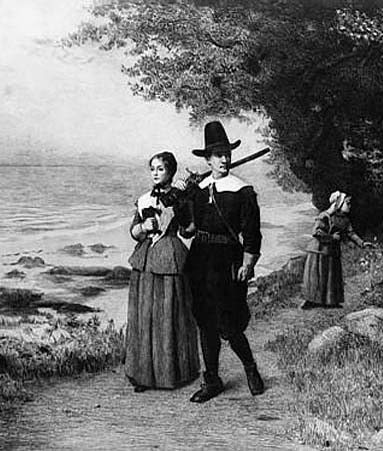Thursday, January 14, 2010
The Puritan's Lasting Legacy . . .
Legacy's of the Puritans and Pilgrims
Monday, January 11, 2010
Puritans in Plymouth
The early 17th Century was a time of social upheaval in England. Many new protestant sects were challenging the beliefs of the Church of England. The Glorious Revolution and Cromwell had also created a new set of political beliefs. The true believers in representative government (although mostly under a limited monarchy) were the Whigs although some Whigs were more radical than others. The Whigs held a majority for a time, but eventually Tories rose up to support the old system, and a balanced two party system evolved. Given the times, it is not surprising that many of those who came to America were both religious separatists, and dyed in the wool radical Whigs.
The religious separatists had varying beliefs, with the common thread being that they were opposed to, and persecuted by the Anglican Church. Quakers had a rather strong belief in a brotherhood of believers whose combined will was inspired by the will of God. Despite being born to a wealthy and influential family William Penn became a Quaker in his youth. This religious choice shaped his life. The King rewarded Penn’s father with a huge land grant in America, and Penn saw this as a chance to found a colony in which his religious beliefs could be free. He also set up a legislature that was to make laws for Pennsylvania. The Quakers remained a force in Pennsylvania up until and even after the Revolution.
About the same time, religious separatists known as Puritans, who had been forced out of England to the Netherlands set sail on a ship called the Mayflower with the expressed purpose of founding a biblical “city on a hill” in America. During their voyage they drafted some bylaws for their government known as the Mayflower Compact. Thos compact made the new colony in what was to become Massachusetts governed by a representative assembly. The compact was only in force for about 10 years, but it remains the foundation Massachusetts was built upon. Puritans had strong beliefs that living virtuously according to their interpretation of God’s word here on Earth was the only way to heaven.
Over time Puritanism became somewhat less dogmatic and also less prevalent, but in the early days before Salem and the witch trails the intent was to found a pure Godly colony of believers. Despite their professed beliefs the Puritans were also human, and much of the writing of Nathaniel Hawthorne is a commentary upon religious hypocrisy.
In summary, political and religious beliefs were often the motivation for those who chose to come to America in its earliest days. As these colonies became established, and populations multiplied many of the radical beliefs of early 17th Century England became strongly entrenched in America, and a certain amount of neglect or at least hands off treatment by the Crown and Parliament reinforced these beliefs by precedents. By the late 18th Century the descendants of these radicals would become Revolutionaries and founders of a new nation, and do it without breaking with most of the traditions their societies were founded upon.
Click This Link to learn more: Plymouth, Puritans, Penn, Quakers,: Puritans Founded Plymouth and William Penn Founded Pennslyvania http://colonial-america.suite101.com/article.cfm/plymouth_puritans_penn_quakers#ixzz0cKCX9uQJ
Wednesday, January 6, 2010
"Dissent in Massachusetts Bay
Governor John Winthrop expelled Anne Hutchinson from the Massachusetts Bay Colony in 1638."There was not too much room for religious disagreement in the Massachusetts Bay Colony. Puritans defended their DOGMA with uncommon fury. Their devotion to principle was God's work; to ignore God's work was unfathomable. When free-thinkers speak their minds in such a society, conflict inevitably results."
Such was the case in Massachusetts Bay when Anne Hutchinson and Roger Williams spoke their minds.
"ANNE HUTCHINSON was a deeply religious woman. In her understanding of Biblical law, the ministers of Massachusetts had lost their way. She thought the enforcement of proper behavior from church members conflicted with the doctrine of predestination. She asked simply: "If God has predetermined for me salvation or damnation, how could any behavior of mine change my fate?"
Mary Dyer was the first woman executed for her religious beliefs in Massachusetts Bay Colony."This sort of thinking was seen as extremely dangerous. If the public ignored church authority, surely there would be anarchy. The power of the ministers would decrease. Soon over eighty community members were gathering in her parlor to hear her comments on the weekly sermon. Her leadership position as a woman made her seem all the more dangerous to the Puritan order."
The clergy felt that Anne Hutchinson was a threat to the entire Puritan experiment. They decided to arrest her for HERESY. In her trial she argued intelligently with John Winthrop, but the court found her guilty and banished her from Massachusetts Bay in 1637.
Controversy


